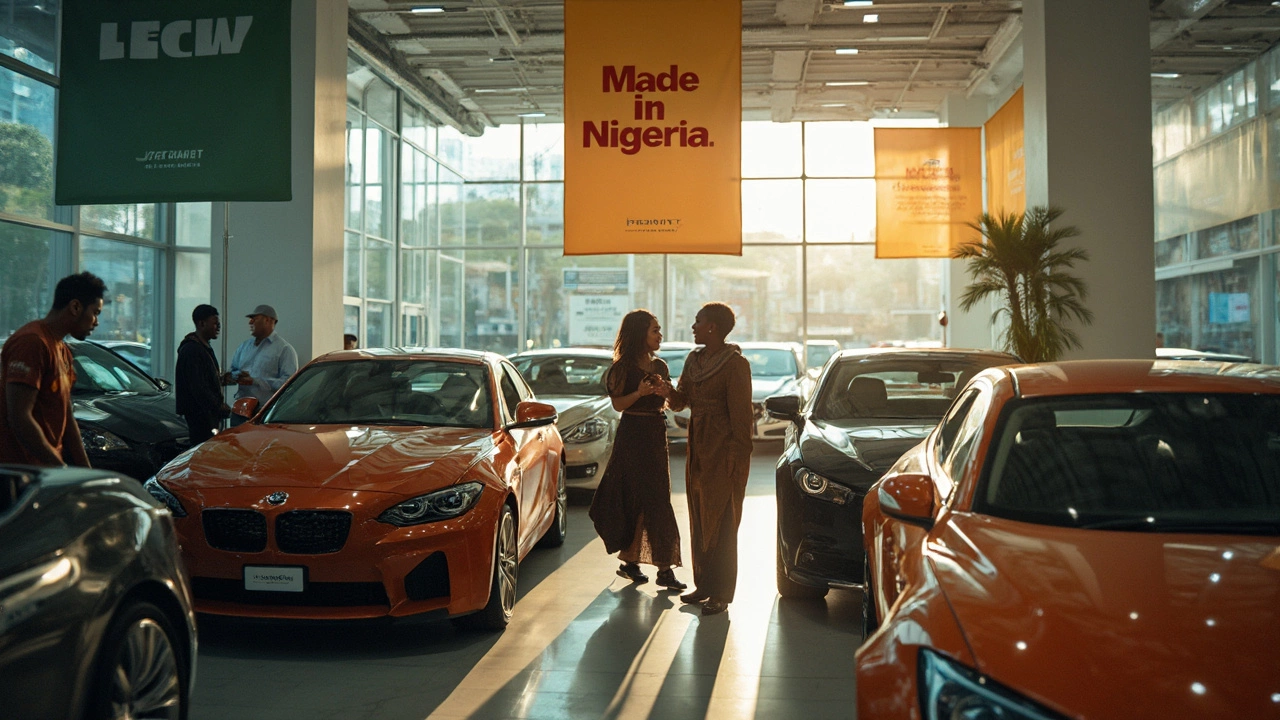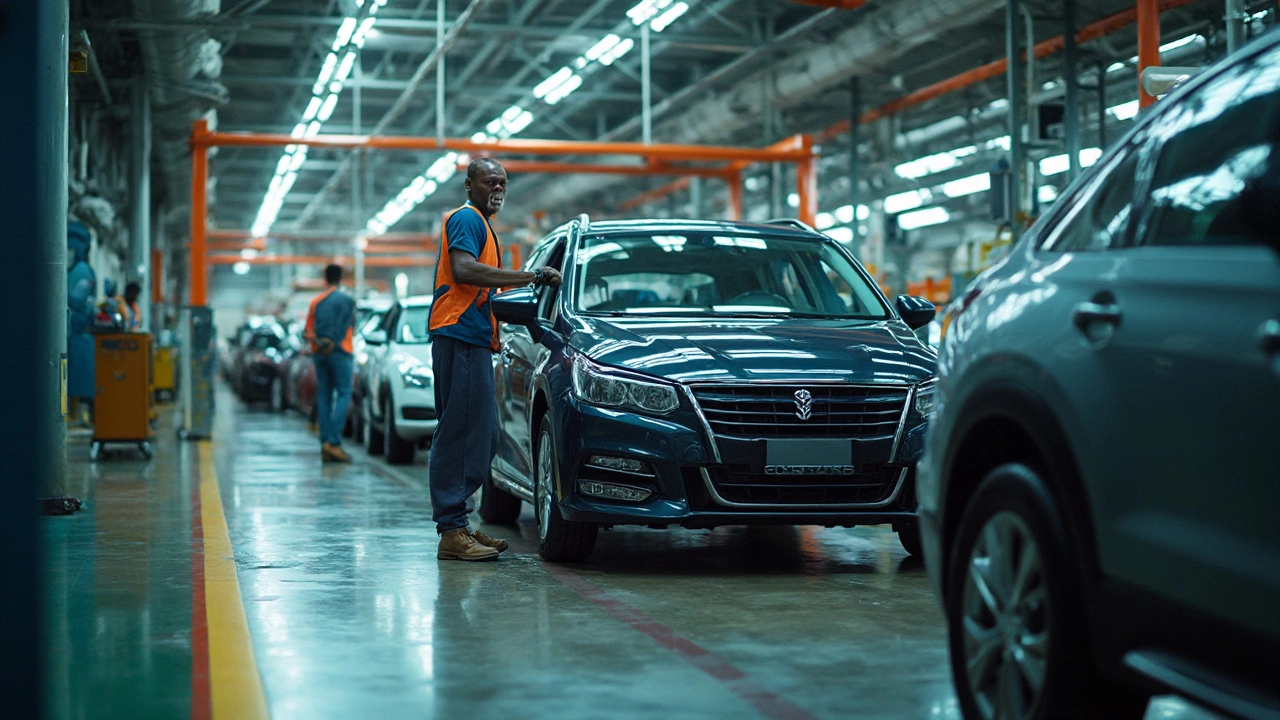Ever wondered if that shiny car on the Lagos street was actually built in Nigeria? Turns out, Nigeria’s auto industry is way more active than people think. Brands aren’t just importing cars anymore—they’re building and assembling them right here on home turf.
In fact, over the past decade, the scene has completely changed. Some companies now bring in car parts (that’s CKD and SKD kits, if you’re nerdy about the details) and put them together in Nigerian factories, from Lagos to Kaduna. This supports local jobs and even trims prices for buyers who want something fresh but affordable, since import taxes on finished cars are a killer.
If you’re shopping for a car in Nigeria, knowing who actually builds cars here can save you a ton of cash, and maybe even get you something faster than waiting for a slow boat from Europe or Asia. We’ll get into which brands deserve that ‘Made-in-Nigeria’ badge, who’s really serious about sticking around, and how you can spot the difference for yourself. Ready for the real deal behind the badges?
- Nigeria’s First Homegrown Car Makers
- Global Brands Setting Up Shop
- How to Spot a Made-in-Nigeria Car
- Why Local Assembly Matters for India
Nigeria’s First Homegrown Car Makers
If you want to talk about made-in-Nigeria cars, you have to start with Innoson Vehicle Manufacturing (IVM). This company kicked things off from Umudim, Nnewi, and basically put Nigerian car production on the map. Innoson is the first real attempt to create cars for Nigerians by Nigerians—no fancy imports, just stuff built for our roads and local wallets.
Innoson makes it clear on their website: their cars, buses, and trucks are assembled in Nigeria. They churn out everything from small saloon cars (like the Innocent G5) to heavy-duty buses for public transport. Over 60% of the parts are made in Africa, and that's not just a marketing line. IVM works with local suppliers, so it really does keep jobs at home.
- Innoson G5/G6: reliable sedans and compact SUVs that pop up everywhere, from government fleets to family school runs.
- Innoson Umu: a pick-up built for the tough work in agriculture and construction.
- Buses & Minibuses: commonly used for intercity travel, sometimes even used by major transport companies.
Another player, though not as famous as Innoson, is Stallion Group. They started assembling Hyundai and Nissan passenger cars in Lagos under the brand VON Automobiles. While Stallion relies more on imported kits, they’re slowly upping local content to meet government rules—which means more Nigerian jobs and less dependence on imports.
If you’re ever in doubt, here’s a tip: check for a metal plate under the hood or on the driver’s side doorframe. Most true made-in-Nigeria car models have “Assembled in Nigeria” stamped there. That’s your quick hack to spot the real deal when browsing dealer lots or checking used cars online.
| Brand | Location | Main Models |
|---|---|---|
| Innoson | Nnewi, Anambra | G5, G6, Umu Pickup, Buses |
| Stallion Group (VON) | Lagos | Hyundai, Nissan Sedans & SUVs |
So whether you’re a buyer, auto fan, or just tired of paying sky-high prices for imported wheels, you’ve got real options built for Nigerian roads and weather. And that's something not every country can brag about.
Global Brands Setting Up Shop
Picture this: big auto names rolling out their made-in-Nigeria cars with pride. Ten years ago that sounded like a fantasy, but now, it’s real. Some of the biggest brands are actually putting up factories and assembly lines right here, making it a game-changer for the local market.
Innoson Vehicle Manufacturing takes the top spot, being Nigeria’s own. But don’t miss out on the global players: Peugeot (under PAN Nigeria), Hyundai, and Kia have all set up assembly plants. Take PAN Nigeria, for example—they’ve been rolling out Peugeot models like the 301 and 508 since the 1970s and upgraded since 2014 to focus on local assembly to avoid heavy import tariffs.
Japanese giant Honda has their motorcycle and car assembly facility in Ota, Ogun State. Nissan set up shop as early as 2014, pushing the first locally assembled Nissan Patrol. The South African-based arm of Volkswagen entered the Nigerian scene too, and Ford operates an SKD assembly plant in Lagos for the Ranger pick-up truck—ideal for Nigerian roads.
| Brand | Location | Popular Models Assembled |
|---|---|---|
| Peugeot (PAN) | Kaduna | 301, 508, 308 |
| Hyundai/Kia | Lagos | Hyundai Accent, Kia Rio |
| Innoson | Umuahia/Enugu | IVM G5, Uzo, FOX |
| Honda | Ota, Ogun State | Honda Accord, Civic |
| Nissan | Lagos | Patrol, Almera |
| Ford | Lagos | Ranger |
For buyers, this means models built for Nigerian roads, less waiting time for delivery, and sometimes, parts that are easier to source. Plus, local assembly usually keeps costs down—sometimes as much as 15-20% lower than imports, according to actual dealer quotes in Lagos last year.
Here’s a tip: if you’re after a truly local made-in-Nigeria car, always ask the seller or dealer about the assembly plant, and check if there’s a VIN sticker showing Nigerian manufacturing info. It’s not just about supporting jobs—it’s getting value that's tailored for you.

How to Spot a Made-in-Nigeria Car
When you’re standing in front of a car, figuring out if it’s really a made-in-Nigeria car doesn’t need to be a guessing game. There are a few dead giveaways on the car itself, along with some things the dealer should tell you if you ask the right questions.
Start with the basics: check the label. All vehicles assembled locally have a metal or sticker plate, usually found under the hood or around the driver’s door. This “Vehicle Identification Plate” shows where the car was put together. If it says Lagos, Kaduna, or any other Nigerian city, you’re looking at the real deal.
VIN (Vehicle Identification Number) is your next friend. The first few digits on the VIN point to the country where final assembly was done. For cars built in Nigeria, this includes codes like ‘NL5’ (for Innoson) or, in some cases, a special mark in the VIN sequence to indicate local builds. Dealers will often list this in the logbook or car documents—don’t be afraid to ask them specifically for proof.
- Innoson: Nigeria’s pride. Their models like the Umu sedan and Fox are built in Umudim, Nnewi. Their VIN is the best giveaway.
- Peugeot (PAN Nigeria): Peugeot’s 301, 508, and some commercial vehicles, assembled in Kaduna. If you find "PAN Kaduna" in the documentation, you’re set.
- Hyundai/ Kia (Stallion Motors): Most models such as the Hyundai Grand i10 and Kia Rio come from the Lagos assembly plant. Look for Lagos in the paperwork or labels.
- Honda: Honda’s Civic and Accord were assembled for a while in Ota, Ogun State—though not all dealers still offer them. VIN and compliance certificates tell you what’s up.
Another tip: The window sticker price can hint at a made-in-Nigeria car too. Locally assembled cars are usually cheaper than fully imported ones, thanks to lower import tariffs. Sometimes the difference can be as much as N1-2 million for the same model.
You can also compare some specs and finishing touches. Many local assembly lines tweak models slightly to better handle Nigerian roads or climate—think uprated suspensions or better air filters. It’s not always huge, but it helps these cars last longer out here.
| Brand | Assembly Location | Sample Model | Special Mark |
|---|---|---|---|
| Innoson | Nnewi | IVM Fox | VIN starts with NL5 |
| Peugeot | Kaduna | 301 | PAN Kaduna on docs |
| Hyundai | Lagos | Grand i10 | Lagos on label |
If you ever feel unsure, snap a photo of the VIN and paperwork, then call or email the manufacturer. They’ll confirm if you’re getting a true made-in-Nigeria car or just an import with a fancy story.
Why Local Assembly Matters for India
This might surprise some folks, but local car assembly in Nigeria has some huge lessons for India and its auto scene. Both countries have a giant middle class and a growing demand for affordable, reliable cars. So, it’s not just about patriotism or waving the flag—local assembly really affects what we pay, what’s available, and even how fast spare parts get to you.
Here’s what stands out: When global automobile manufacturing brands set up shop in Nigeria instead of just shipping in cars, they dodge heavy import tariffs. This recipe is already familiar in India. Cars assembled locally end up way cheaper for buyers because companies only bring in what they need, when they need it. In India, this is why you see more affordable options from brands like Maruti Suzuki, Hyundai, and Tata—because so much of the assembly happens on Indian soil.
The Nigerian approach has made some brands rethink their Africa plans. In fact, car sales in Nigeria went up by nearly 200% when companies like Innoson and even Honda started rolling finished cars out of local plants. That’s extra proof of how a MADE-IN-NIGERIA tag (or a made-in-India badge) isn’t just branding—it literally changes what people can afford to drive.
| Country | Average Tariff on Imported Cars | Most Popular Locally Assembled Brand |
|---|---|---|
| Nigeria | 35%+ | Innoson |
| India | 60%+ | Maruti Suzuki |
For Indian car makers eyeing Africa, Nigeria is a case study. If companies want to succeed long-term, local automobile manufacturing can’t be ignored. It creates jobs, builds technical skills, and lets brands customize cars to local roads and tastes. Plus, assembly plants mean quicker repairs and better access to made-in-Nigeria cars or local parts. If you’re buying—or even if you sell—knowing about local production lets you pick smarter and worry less about getting stuck waiting for foreign shipments.
Here are a few quick tips for Indian buyers and car dealers:
- Check the VIN (vehicle identification number) for clues on where the car was assembled.
- Ask the dealer if warranty and spare part support comes from local assembly plants.
- Lean toward brands with a reputation for fast local service and not just flashy import commercials.
